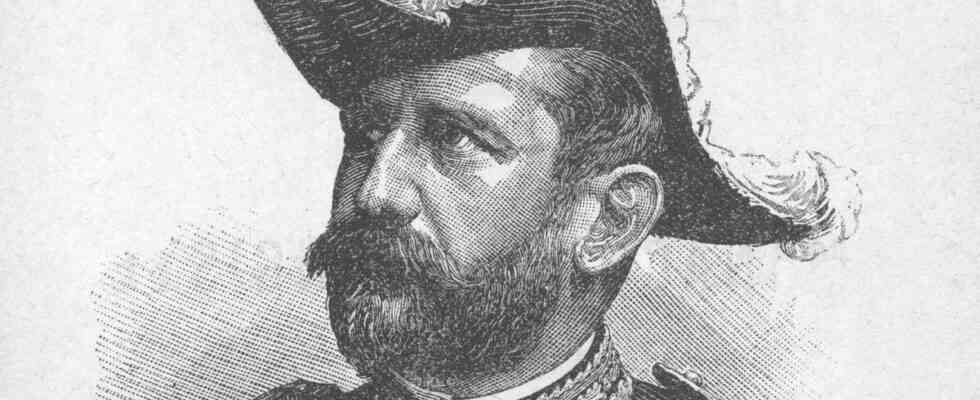“General Boulanger’s popularity came too quickly, to someone who liked noise too much, or, to be more fair, who didn’t avoid it enough. In July 1887, before Parliament, Georges Clemenceau officially distanced himself from his former protege. The too troublesome General Boulanger is sent to take command in Clermont-Ferrand, far from Paris. Yet it was Clemenceau who had supported his appointment as Minister of War in January 1886. A godsend for this “upstart”, as described by Bertrand Joly, a former university professor and author ofThe origins of populism – History of Boulangism (1886-1891) (CNRS Editions). A career soldier, Georges Boulanger took part in campaigns in Algeria, Italy and Cochinchina (now Vietnam), in the repression of the Paris Commune and was injured several times. “Honourable, but not dazzling records of service,” says Bertrand Joly.
What the minister has for him is a formidable “gift for political communication”, continues the historian. At the ministry, Georges Boulanger undertook very popular reforms, but without any real strategic interest, such as improving the ordinary of the soldiers or the adoption of the Lebel rifle, the first weapon in the world to use smokeless powder. And above all, he “subsidizes sheets to his glory”, specifies Bertrand Joly. “Boulanger is in a way a man of publicity. He understood that the form counts more than the substance. He knows how to talk and make people talk about him. In a few months, the minister thus became “the most famous man in France”, as noted by the Journal of Saint-Quentin and Aisne, in its edition of June 17, 1887, “manufacturing this great popularity with the help of artifices of advertisements”.
In a France humiliated by the defeat of 1870, General Boulanger multiplied his provocations against Germany. Guided by the propaganda of the providential man, the population saw in him a patriotic hero and nicknamed him “General Revanche”. “Boulanger succeeds in becoming the popular personality of the country by espousing the collective fantasies of a disoriented French opinion, in need of a charismatic leader”, writes the historian Jean Garrigues in Baker, or the factory of the providential man. The minister becomes too conspicuous, too popular, too dangerous for the young Third Republic whose institutions are still fragile.
The Gatherer of Anger
In May 1887, he was not reappointed to the new government. A betrayal, for his supporters. Several dozen ballot papers bearing his name are slipped into the ballot boxes during a partial legislative election in the Seine department. As a soldier, Boulanger cannot be elected. He was sent to Clermont-Ferrand, then retired automatically from the army a few months later.
The general “had a very bad experience of his ousting because he was a soldier at heart”, says Bertrand Joly. For his increasingly numerous supporters, this is an additional reason for anger. Because behind Boulanger gather dissatisfied people from all sides. Faced with unstable governments, in a France in the midst of a crisis economic, social and of confidence towards the political elites, the baker style appeals and casts a wide net. “He promised everything to everyone. His program was very vague. He wanted to revise the Constitution, but without saying how,” explains Bertrand Joly. Among his supporters are nationalists, radical republicans, but also bonapartists and monarchists. “By embodying the image of a military and popular hero, referred to the model of the Bonapartist Alexander, as well as the patriotic republican heir to Gambetta, General Boulanger achieved the fusion of the two strongest symbolic currents of his time” , summarizes Jean Garrigues.
Driven to coup
Boulanger now has a free hand to stand for election. His election campaigns are accompanied by an army of peddlers, “that is to say professional demonstrators”, specifies Bertrand Joly. People paid to applaud his passing, distribute songs and newspapers to his glory. Boulanger was elected to the Chamber of Deputies in April 1888.
The retired soldier and his supporters see even bigger. Thanks to financing of royalists and Bonapartists, pro-Boulanger propaganda is gaining even more momentum in view of a by-election in Paris. On January 27, 1889, Boulanger was elected deputy of the Seine, “defeating the radical republicans in their own bastion”, recalls Bertrand Joly. “Paris has just spoken and the great Republican city has given the leader of the National Party a Republican majority,” writes the major popular daily. The Press. As Boulanger celebrates his victory, the crowd present pushes him to the coup, but he refuses. “He was afraid of failing and thought above all of becoming President of the Council six months later, by winning the legislative elections”, indicates Bertrand Joly.
Threatened by the issuance of an arrest warrant for conspiring against state security, Boulanger fled to Brussels with his mistress on April 1. “The Republicans are preparing the counter-offensive by modifying the electoral law. The accumulation of applications is now prohibited, ”says Bertrand Joly. Boulangism collapsed in the legislative elections of September 1889. “The Third Republic was afraid, but did not waver in the face of Boulangism, specifies Bertrand Joly. The regime even emerged strengthened from this episode. The radical republicans gradually became more moderate, while the royalists and the Bonapartists gradually rallied to the Republic. Boulanger is ultimately a failed providential man that the malcontents have used for lack of anything better. Still in exile, General Boulanger committed suicide on September 30, 1891 at the grave of his mistress in Brussels. Never stingy with good words, Clemenceau would say of him: “He died as he lived: as a second lieutenant. »

